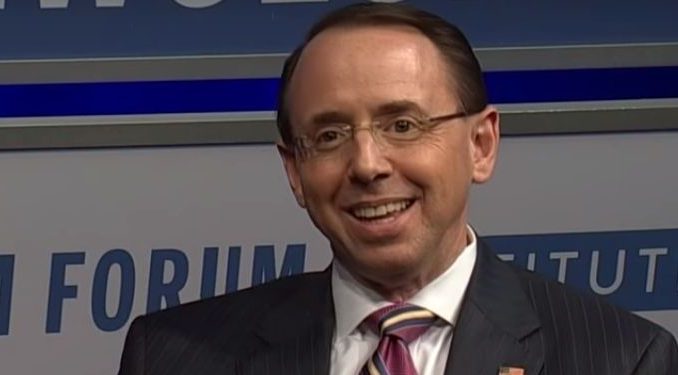
At a “Law Day” chat at the Freedom Forum Institute (formerly the Newseum), Deputy Attorney General Rod J. Rosenstein forcefully pushed back against a politicized effort to potentially impede the Department of Justice’s efforts to uphold the rule of law. The Deputy Attorney General declared of those who had drafted articles of impeachment against him, “I think they should understand by now that the Department of Justice is not going to be extorted.” He also noted that “nobody” had “the courage to put their name” to that document.
That last observation is particularly important. Not one of those who drafted the articles of impeachment or otherwise enabled their development possessed the courage to put their name to the document. Why?
Their timidity is a strong indication that the authors of the document and those who enabled its development recognize that it is a purely political and highly dishonorable document. They recognize that is detached from any desire to promote the rule of law, much less uphold the Constitution. They understand that it is a vehicle with the sinister effort to undermine the pursuit of the truth necessary to uphold the rule of law on which the nation’s Constitutional framework depends.
Such cowardice is not exceptional. In fact, it is among the long-running themes in human history, often competing with examples of valor. Even the ancients recognized how the timid hid to evade accountability for their choices or refrain from taking even minimal risks. Ancient Greek playwright Euripides explained, “A coward turns away, but a brave man’s choice is danger.” Those behind the document “turned away” from attaching their names to it. They ran.
In stark contrast, those who seek the truth, who endeavor to uphold the rule of law, or who pursue some other honorable cause, possess the courage to stand fully and visibly behind their cause. Charles Seymour, who served as President of Yale University offered an example of such an appetite for transparency in explaining, “We seek the truth, and will endure the consequences.” Attaching one’s name to a cause demonstrates unequivocally that one is prepared to “endure the consequences” whatever they might be.
The Declaration of Independence provides a defining example of such courage in the American historical experience. The closing paragraph of that document proclaimed:
We, therefore, the Representatives of the united States of America, in General Congress, Assembled, appealing to the Supreme Judge of the world for the rectitude of our intentions, do, in the Name, and by Authority of the good People of these Colonies, solemnly publish and declare, That these United Colonies are, and of Right ought to be Free and Independent States; that they are Absolved from all Allegiance to the British Crown, and that all political connection between them and the State of Great Britain, is and ought to be totally dissolved; and that as Free and Independent States, they have full Power to levy War, conclude Peace, contract Alliances, establish Commerce, and to do all other Acts and Things which Independent States may of right do. And for the support of this Declaration, with a firm reliance on the protection of divine Providence, we mutually pledge to each other our Lives, our Fortunes and our sacred Honor.
They pledged their “sacred honor.” They pledged their “fortunes.” They pledged their “lives.” They were willing to pay the ultimate price, because the knew that their cause was right, just, and honorable.
That willingness to bind themselves to the cause of American independence inspired others to stand behind a cause for which success was far from assured. Imagine if they had taken the route pursued by those behind the draft articles of impeachment targeting the Deputy Attorney General and no one signed the Declaration. Then, few might have rallied to a cause for which no one was willing to put himself at any degree of risk. Then, the United States would almost certainly have remained a colony for many decades longer. Then, the Constitution that has played no small role in shaping the nation’s destiny and safeguarding the basic liberties of its citizens might never have come about.
Under such circumstances, not only the United States, but all of humanity would be far worse off than they are today. Fortunately, unlike with the drafters of the articles of impeachment, the nation’s Founders were filled with courage. That courage altered the course of history, tipping the balance in favor of freedom and prosperity for hundreds of millions of people all across the world.
